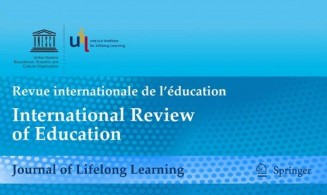

Just published: IRE special issue on the future of adult education and lifelong learning for all
ire_cove_final_old_site.png

The latest number of the International Review of Education – Journal of Lifelong Learning is a special issue which aims to inform debate at CONFINTEA VII and to stimulate reflection on how adult education can support the achievement of the Sustainable Development Goals.
In their introduction to the special issue entitled “Strengthening the future of adult education and lifelong learning for all: Building bridges between CONFINTEA and the SDGs”, guest editors Aaron Benavot, Heribert Hinzen, Catherine Odora Hoppers and Ashley Stepanek Lockhart argue that the international adult education community has reached a pivotal historical juncture. It faces a range of critical challenges, including the educational implications of climate change, environmental degradation and unsustainable lifestyles; widening social and economic divisions; weakening democratic institutions and processes; outbreaks of war, conflict and hate crime; massive shifts in technology, globalisation and workplace relations; and migration movements and intergenerational demographic trends.
They ask how the adult education community can respond to these shifting realities and to what appear to be fragile and uncertain futures. The convening of the Seventh International Conference on Adult Education (CONFINTEA VII) in June 2022 provides a timely opportunity for proponents and practitioners of adult education to consider ways of addressing these serious challenges.
The contributing authors include renowned scholars in the field of adult education and learning (ALE). David Archer and Idowu Biao, in their respective articles, consider how ALE financing can be improved. In the third article, Ulrike Hanemann and Clinton Robinson focus on rethinking adult literacy from a lifelong learning perspective. The fourth article, co-authored by Sonja Belete, Chris Duke, Heribert Hinzen, Angela Owusu-Boampong and Hữu Phước Khấu, investigates the potential of increasing participation in ALE through the establishment of more community learning centres.
The last two articles focus on how monitoring ALE against international commitments can be improved in different ways. In the first of these, Ellen Boeren and Kjell Rubenson take a close look at the utility of the Global Report on Adult Learning and Education (GRALE) as a monitoring mechanism. In the issue’s final article, Ashley Stepanek Lockhart explores ways of leveraging GRALE and monitoring strategies of ALE-related targets within the fourth Sustainable Development Goal (SDG 4) to increase coverage and efficiency of these processes by combining efforts from within different parts of UNESCO, while also maintaining their separate added value.
Between them, the six articles featured in this special issue explore ways of expanding and institutionalising adult education for all within a lifelong learning perspective. They seek to contribute to discussions that bridge the CONFINTEA process of reviewing and improving with the wider 2030 Agenda for Sustainable Development and, in so doing, carve out new vistas on the futures of adult education. In the final section of their introduction, the guest editors complement the ideas presented in their introduction with key findings from the articles, to formulate a succinct set of recommendations.


